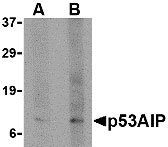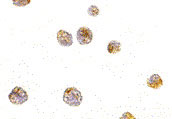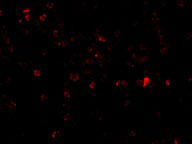p53AIP1 Antibody
- SPECIFICATION
- CITATIONS
- PROTOCOLS
- BACKGROUND

Application
| WB, IF, ICC, E |
|---|---|
| Primary Accession | Q9HCN2 |
| Other Accession | BAB16421, 10798768 |
| Reactivity | Human |
| Host | Rabbit |
| Clonality | Polyclonal |
| Isotype | IgG |
| Calculated MW | 12935 Da |
| Application Notes | p53AIP1 antibody can be used for detection of p53AIP1 by Western blot at 4 - 8 µg/mL. Antibody can also be used for immunocytochemistry starting at 10 µg/mL. For immunofluorescence start at 20 µg/mL. |
| Gene ID | 63970 |
|---|---|
| Other Names | p53AIP1 Antibody: P53AIP1, p53-regulated apoptosis-inducing protein 1, p53AIP1, tumor protein p53 regulated apoptosis inducing protein 1 |
| Target/Specificity | TP53AIP1; |
| Reconstitution & Storage | p53AIP1 antibody can be stored at 4℃ for three months and -20℃, stable for up to one year. As with all antibodies care should be taken to avoid repeated freeze thaw cycles. Antibodies should not be exposed to prolonged high temperatures. |
| Precautions | p53AIP1 Antibody is for research use only and not for use in diagnostic or therapeutic procedures. |
| Name | TP53AIP1 |
|---|---|
| Function | May play an important role in mediating p53/TP53-dependent apoptosis. |
| Cellular Location | Mitochondrion. |
| Tissue Location | Only found to be expressed in thymus. |

Thousands of laboratories across the world have published research that depended on the performance of antibodies from Abcepta to advance their research. Check out links to articles that cite our products in major peer-reviewed journals, organized by research category.
info@abcepta.com, and receive a free "I Love Antibodies" mug.
Provided below are standard protocols that you may find useful for product applications.
Background
p53AIP1 Antibody: The p53 tumor-suppressor protein can induce apoptosis through transcriptional activation of several genes. One such protein p53AIP was initially identified through direct cloning of p53 binding sequences from human genomic DNA. Its expression is inducible by p53 following p53 phosphorylation on Ser-46, and ectopic expression of p53AIP leads to apoptotic cell death. Both the phosphorylation of p53 and the induction of p53AIP were blocked by inhibiting the expression of p53DINP1 by the introduction of antisense oligonucleotides to p53DINP1, suggesting that the apoptosis associated with p53AIP expression is regulated by p53DINP1. Finally, as adenovirus-mediated introduction of p53AIP has been shown to suppress tumor growth in vivo, it has been suggested that p53AIP gene transfer may become a useful strategy for the treatment of p53-resistant cancers. Three isoforms of p53AIP are known to exist; this antibody will detect all three.
References
Kern SE, Pietenpol JA, Thiagalingam S, Seymour A, et al. Oncogenic forms of p53 inhibit p53-regulated gene expression. Science1991; 252:1708-11.
Oda K, Arakawa H, Tanaka T, et al. p53AIP1, a potential mediator of p53-dependent apoptosis, and its regulation by Ser-46-phosphorylated p53. Cell2000; 102:849-52.
Okamura S, Arakawa H, Tanaka T, et al. p53DINP1, a p53-inducible gene, regulates p53-dependent apoptosis. Mol. Cell2001; 8:85-94.
Yoshida K, Monden M, Nakamura Y, et al. Adenovirus-mediated p53AIP1 gene transfer as a new strategy for treatment of p53-resistant tumors. Cancer Sci.2004; 95:91-7.
If you have used an Abcepta product and would like to share how it has performed, please click on the "Submit Review" button and provide the requested information. Our staff will examine and post your review and contact you if needed.
If you have any additional inquiries please email technical services at tech@abcepta.com.













 Foundational characteristics of cancer include proliferation, angiogenesis, migration, evasion of apoptosis, and cellular immortality. Find key markers for these cellular processes and antibodies to detect them.
Foundational characteristics of cancer include proliferation, angiogenesis, migration, evasion of apoptosis, and cellular immortality. Find key markers for these cellular processes and antibodies to detect them. The SUMOplot™ Analysis Program predicts and scores sumoylation sites in your protein. SUMOylation is a post-translational modification involved in various cellular processes, such as nuclear-cytosolic transport, transcriptional regulation, apoptosis, protein stability, response to stress, and progression through the cell cycle.
The SUMOplot™ Analysis Program predicts and scores sumoylation sites in your protein. SUMOylation is a post-translational modification involved in various cellular processes, such as nuclear-cytosolic transport, transcriptional regulation, apoptosis, protein stability, response to stress, and progression through the cell cycle. The Autophagy Receptor Motif Plotter predicts and scores autophagy receptor binding sites in your protein. Identifying proteins connected to this pathway is critical to understanding the role of autophagy in physiological as well as pathological processes such as development, differentiation, neurodegenerative diseases, stress, infection, and cancer.
The Autophagy Receptor Motif Plotter predicts and scores autophagy receptor binding sites in your protein. Identifying proteins connected to this pathway is critical to understanding the role of autophagy in physiological as well as pathological processes such as development, differentiation, neurodegenerative diseases, stress, infection, and cancer.




